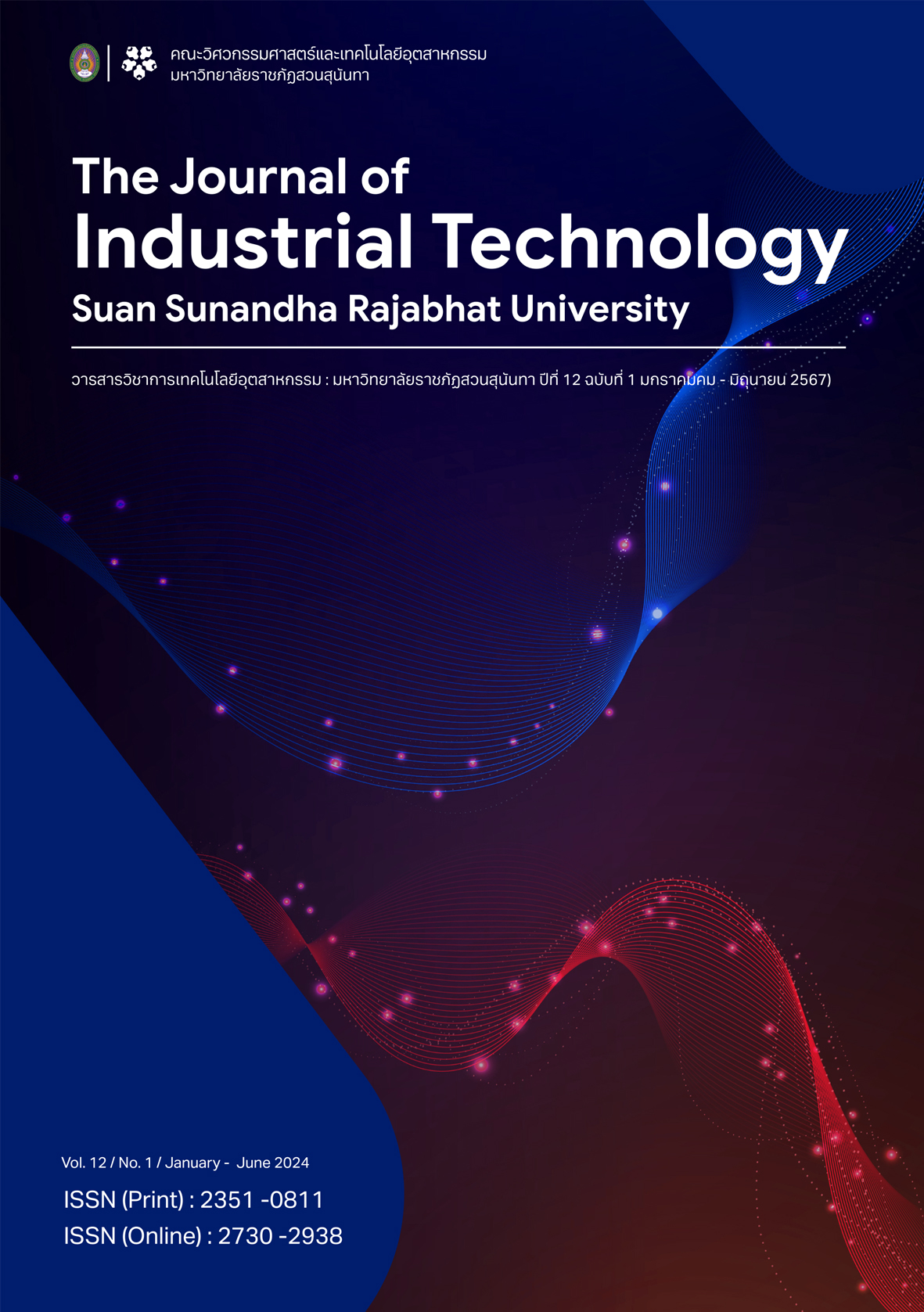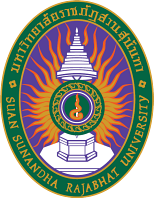การประเมินประสิทธิภาพเชิงนิเวศเศรษฐกิจของกระบวนการจัดการน้ำเสีย อย่างยั่งยืนในนิคมอุตสาหกรรมพื้นที่ภาคตะวันออก
คำสำคัญ:
ประสิทธิภาพเชิงนิเวศเศรษฐกิจ, ก๊าซเรือนกระจก, น้ำเสีย, น้ำที่บำบัดแล้วนำกลับมาใช้ใหม่, การประเมินวัฏจักรชีวิตบทคัดย่อ
การจัดการทรัพยากรน้ำในอุตสาหกรรมในปัจจุบัน ใช้แนวทางการนำน้ำกลับมาใช้ใหม่โดยเฉพาะยิ่งการจัดการน้ำเสียที่ผ่านการบำบัดจากระบบบำบัดน้ำเสียแล้ว โดยงานวิจัยครั้งนี้มีวัตถุประสงค์เพื่อศึกษาประสิทธิภาพระบบบำบัดน้ำเสียชีวภาพภายใต้การดำเนินงานของนิคมอุตสาหกรรมในพื้นที่จังหวัดชลบุรี ตระหนักถึงการดำเนินงานตามเป้าหมายการพัฒนาที่ยั่งยืน ขององค์การสหประชาชาติ เป้าหมายที่ 6 ว่าด้วย สร้างหลักประกันเรื่องน้ำและการสุขาภิบาลให้มีการจัดการอย่างยั่งยืน และมีสภาพพร้อมใช้สำหรับทุกคน จากการบริหารงานที่ยั่งยืน โดยการใช้เครื่องมือด้านสิ่งแวดล้อมต่างๆ มาบูรณาการร่วมกัน นิคมอุตสาหกรรมร่วมดำเนินงานแห่งนี้ ตั้งอยู่ในจังหวัดชลบุรี และได้รับการรับรองเป็นเมืองอุตสาหกรรมเชิงนิเวศ ระดับ Eco-World Class หนึ่งในการดำเนินงานการจัดการทรัพยากรคือน้ำและน้ำเสีย โดยมีกระบวนนำน้ำเสียที่ผ่านกระบวนการบำบัดนำกลับมาใช้ใหม่ ตามแนวคิดเศรษฐกิจหมุนเวียน มุ่งเน้นให้เกิดการประเมินผลกระทบทางสิ่งแวดล้อมน้อยที่สุดต่อการลดการใช้ทรัพยากรน้ำและมลพิษน้ำรวมถึงค่าใช้จ่ายในการจัดการ โดยประเมินวัฏจักรผลิตภัณฑ์ ใช้โปรแกรมสำเร็จรูป openLCA เพื่อประเมินประสิทธิภาพเชิงนิเวศเศรษฐกิจ จากผลการศึกษาจากการประเมินผลกระทบสิ่งแวดล้อมได้แก่ ผลต่อสุขภาพ, ผลระบบนิเวศน์ และ ผลต่อทรัพยากร เท่ากับ 3.36E-05 DALY, 9.07E+03 PDF.m2.yr และ 2.54E+05 MJ ตามลำดับ ซึ่งดัชนีประสิทธิภาพเชิงนิเวศเศรษฐกิจเท่ากับ 65.23 การนำน้ำกลับมาใช้ใหม่มีผลให้การปล่อยก๊าซเรือนกระจกลดลง 34.08% ซึ่งหมายถึงการใช้น้ำที่บำบัดแล้วนำกลับมาใช้ใหม่ ส่งผลให้นิคมอุตสาหกรรมสามารถลดค่าใช้จ่าย และลดการปล่อยคาร์บอนไดออกไซด์ลดลง
เอกสารอ้างอิง
Department of Local Administration Ministry of Interior, Apr. 20, 2022, “Standards and indicators for water pollution management,” [online]. Avaliable: http://www.dla.go.th/work/e_book/eb1/10_9.pdf
Bangkokbiznews, Jun. 26, 2022, “Smart Water Management System in EEC,” [online]. Avaliable: https://www.bangkokbiznews.com/blogs/columnist/125328
National Science and Technology Development Agency, Apr. 21, 2022, “BCG New Business Model,” [online]. Avaliable: https://www.nstda.or.th/home/knowledge_post/bcg:by:nstda/
K. Suwannahong, “Technology Wastewater Treatment in Biological Wastewater Treatment course,” Aug. 24, 2022.
J. Benjawan, Apr. 20, 2022, “Water Resource,” [online]. Avaliable: http://human.tru.ac.th/elearning/Human%20Being/human:detail3_6.html
P. Rinratanakorn, “8 Important factors for concrete development for sustainable success of the EEC,” [online]. Avaliable: https://so05.tci:thaijo.org/index.php/SPUCJ/article/download/240810/163967/827370
R. Singsakda, Aug. 24, 2022, “Water shortage is a problem that everyone must help,” [online]. Avaliable: https://api.dtn.go.th/files/v3/5e96a210ef4140b16555bf53/download
Industrial Estate Authority of Thailand, Aug. 24, 2022, “Principles of ecological industrial development,” [online]. Avaliable: https://eco.ieat.go.th/th/eco-development-principles
Echo community, Aug. 24, 2022, “Sustainable Decentralized Water Treatment for Rural Developing Communities Using Locally Generated Biochar Adsorbents,” [online]. Avaliable: https://www.echocommunity.org/en/resources/f9592532:c0cd:424f:81d5:80444d693a2c
K. Poolsawat, W. Tachajapong, S. Prasitwattanaseree, and W. Wongsapa, “Electricity consumption characteristics in Thailand residential sector and its saving potential.” Energy Reports 2019, October. 2019, vol. 6(1), pp. 337–343.
Caiado, R. G. G., de Freitas Dias, R., Mattos, L. V., Quelhas, O. L. G., and Leal Filho, W., “Towards sustainable development through the perspective of eco: efficiency,” A systematic literature review. Journal of Cleaner Production, vol. 165(1), pp. 890–904, November. 2017.
A. Dania, S. Mohamed, M. Medhat, E. Ahmed, and F. Mai, Nov. 28, 2023, “Life Cycle Assessment of a Domestic Wastewater Treatment Plant Simulated with Alternative Operational Designs.” Sustainability 2023, 15, 9033. [online]. Avaliable: https://www.mdpi.com/2071-1050/15/11/9033
E. Hertwich and R. Wood, “The growing importance of scope 3 greenhouse gas emissions from industry,” Environmental Research Letters 2018, vol. 13(10), October. 2018, pp. 104013.
Čuček, L., Klemeš, J. J., and Z. Kravanja, “Overview of environmental footprints. Assessing and Measuring Environmental Impact and Sustainability 2015,” June 2014, pp.131–193.
P. Schröder, K. Anggraeni & U. Weber, “The Relevance of Circular Economy Practices to the Sustainable Development Goals,” Journal of Industrial Ecology 2018, vol. 23(9), pp.77-95, February. 2018.
International Organization for Standardization, “International Standard ISO 14050,” Fourth edition 2022, pp.9.
Pardo M. C. I., “An analysis of eco: efficiency in energy use and CO2 emissions in the Swedish service industries.” Socio: Economic Planning Sciences, 47(2), pp. 120–130, [online]. Avaliable: https://www.10.1016/j.seps.2012.11.004
N. A. Ramli & S. Munisamy, “Eco: efficiency in greenhouse emissions among manufacturing industries: A range adjusted measure. Economic Modelling,” pp. 219–227, [online]. Avaliable: https://www.10.1016/j.econmod.2015.02.034
ดาวน์โหลด
เผยแพร่แล้ว
รูปแบบการอ้างอิง
ฉบับ
ประเภทบทความ
สัญญาอนุญาต
ลิขสิทธิ์ (c) 2024 คณะวิศวกรรมศาสตร์และเทคโนโลยีอุตสาหกรรม มหาวิทยาลัยราชภัฎสวนสุนันทา

อนุญาตภายใต้เงื่อนไข Creative Commons Attribution-NonCommercial-NoDerivatives 4.0 International License.
บทความที่ได้รับการตีพิมพ์เป็นลิขสิทธิ์ของคณะวิศวกรรมศาสตร์และเทคโนโลยีอุตสาหกรรม มหาวิทยาลัยราชภัฎสวนสุนันทา
ข้อความที่ปรากฏในบทความแต่ละเรื่องในวารสารวิชาการเล่มนี้เป็นความคิดเห็นส่วนตัวของผู้เขียนแต่ละท่านไม่เกี่ยวข้องกับมหาวิทยาลัยราชภัฎสวนสุนันทา และคณาจารย์ท่านอื่นๆในมหาวิทยาลัยฯ แต่อย่างใด ความรับผิดชอบองค์ประกอบทั้งหมดของบทความแต่ละเรื่องเป็นของผู้เขียนแต่ละท่าน หากมีความผิดพลาดใดๆ ผู้เขียนแต่ละท่านจะรับผิดชอบบทความของตนเองแต่ผู้เดียว








